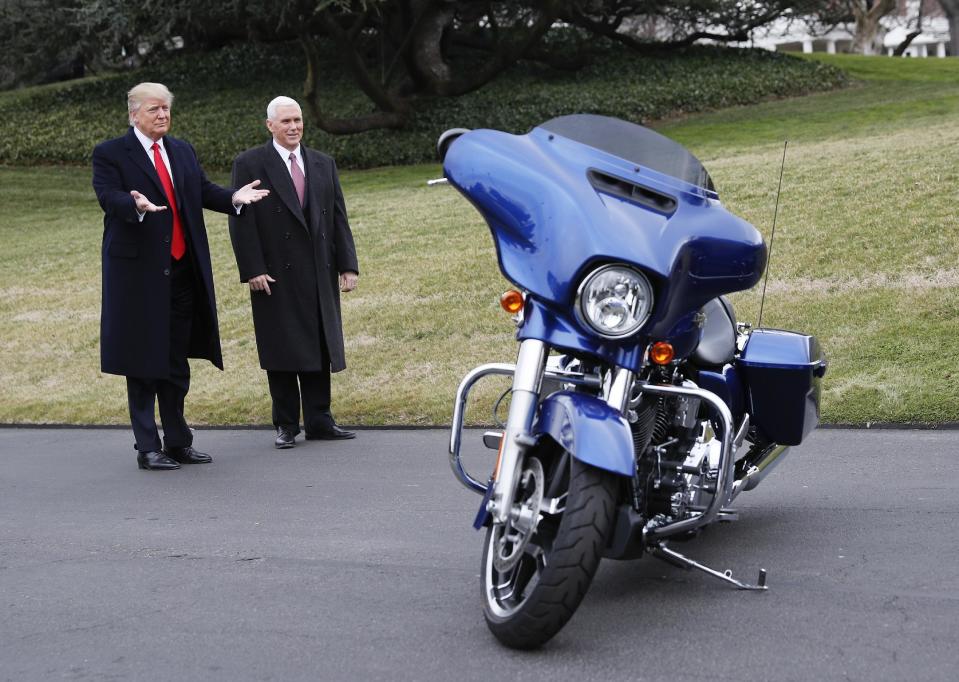Harley-Davidson shows the unintended consequences of Trump's tariffs
Trump’s trade war has officially moved American jobs overseas.
In a regulatory filing on Monday, iconic motorcycle manufacturer Harley-Davidson (HOG) said it is moving the production of motorcycles bound for the EU out of the U.S. as a result of new tariffs.
Harley-Davidson said that tariffs enacted by the EU in response to Trump’s tariffs on the import of steel and aluminum from the EU increased the duty paid by Harley Davidson’s Europe-bound bikes made in the U.S. to 31% from 6%.
This will increase the cost of an average motorcycle by $2,200, the company said. As a result, Harley-Davidson said it will increase production at its international plants over the next 9-18 months.

Because while Harley-Davidson had already announced that it would close a Kansas City plant next year — resulting in the expected loss of 260 jobs in the U.S. — this latest action from the Trump administration adds to the stress of a U.S. corporation struggling with a declining domestic customer base and the allure of moving jobs overseas.
In the first quarter of 2018, U.S. retail sales for the company were down 12% from the prior year; internationally, sales rose 0.2%. International success amid this new trade reality for Harley-Davidson thus pushes a company seen as a mainstay of American manufacturing into prioritizing its investment overseas where trade actions don’t eat into profits as sales grow faster outside the U.S.

And although Trump’s desire to re-write many of the U.S.’s major trade agreements has been a foundation of his political agenda since his campaign began more than three years ago, it wasn’t until the beginning of this year that markets began to take these threats seriously.
It’s taken additional time for the economic realities of these actions to hit markets. And Harley-Davidson’s announcement is the perfect example of what economists call the “second order” effects that shifting trade deals have on economic growth and corporate decision making.
“The indirect effects are what really matter”
Writing in response to the initial tariff of $50 billion on Chinese imports imposed by the Trump administration earlier this month, Barclays economist Michael Gapen wrote that, “The indirect effects are what really matter, including the likely Chinese response and any adverse effects that increased uncertainty may have on business investment and hiring plans.”
Gapen added that, “What is also clear to us is that protectionism will cut against the benefits of the recently enacted Tax Cut and Jobs Act. Anti-trade policies, particularly tariffs, act like a tax on consumers and businesses by raising the cost of trade. By creating uncertainty, they also weigh on asset valuations, which could weaken households’ ability to sustain spending and reduce the incentive for businesses to invest.”
And last week, Federal Reserve chairman Jay Powell said at a meeting of the world’s top central bankers in Portugal that some businesses had put plans to hire or invest on hold because of trade worries and that, “those concerns seem to be rising.”
Stock market volatility in March followed Trump’s initial announcement of tariffs on $50 billion of Chinese goods in late March. This move was met with an immediate retaliatory announcement from Beijing that punctuated a week that saw the stock market fall more than 5%. Since then, Trump has only ramped up his actions, threatening to impose tariffs on $400 billion of Chinese imports and all imported automobiles.
Since the beginning of Trump’s hostile rhetoric on trade, economists have argued that the negative impacts of tariffs would go beyond any measured slowdown in growth.
And Harley-Davidson’s announcement on Monday could just be the beginning of corporate decisions to come.
—
Myles Udland is a writer at Yahoo Finance. Follow him on Twitter @MylesUdland

 Yahoo Finance
Yahoo Finance 
